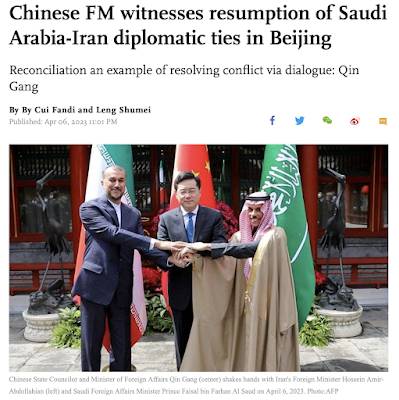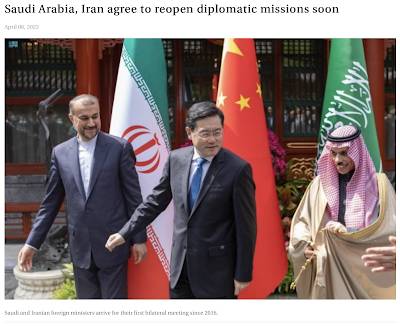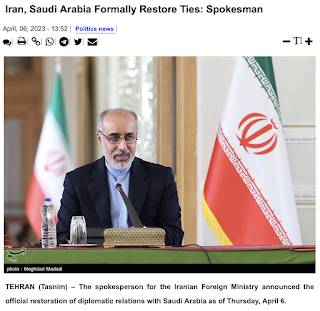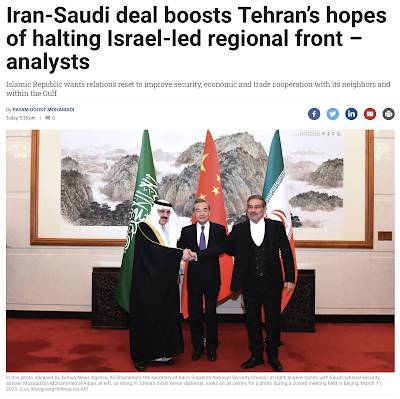
Saudi Arabia and Iran – China’s Role as Mediator in the New Global Order
Here’s the latest news from China as reported in the Global Times, the mouthpiece for China’s Communist Party:
Here’s a quote with my bolds:
“The Thursday meeting in Beijing follows a landmark agreement brokered by China in March to restore diplomatic ties between Saudi Arabia and Iran, and reopen their respective embassies within two months….
It is a strong stimulant in a volatile and uncertain world, he said. Moreover, the multilateral and equal diplomatic relations that China advocates and practices are once again being recognized by other countries, Zhu said. It is at the same time an indication that US diplomacy, which maintains a Cold War mindset, is being abandoned by the world, he noted….
Saudi Arabia and Iran announced the resumption of diplomatic ties with immediate effect on Thursday in Beijing after the first formal meeting between the two countries’ top diplomats in more than seven years. The amplification of China’s mediation between the two countries has been remarkable over the past month, showing that the diplomatic philosophy advocated and practiced by China is being recognized worldwide, experts said…
The improved ties between Saudi Arabia and Iran will help safeguard regional peace and stability, setting an example for the world to solve conflicts via dialogue as well as provide excellent practice of the Global Security Initiative and building a community with a shared future for humanity, Qin said.
Here’s an interesting quote:
“It is a strong stimulant in a volatile and uncertain world, he said. Moreover, the multilateral and equal diplomatic relations that China advocates and practices are once again being recognized by other countries, Zhu said. It is at the same time an indication that US diplomacy, which maintains a Cold War mindset, is being abandoned by the world, he noted.“
Since the Arab Spring – a wave of protests, uprisings, and unrest that spread across Arabic-speaking countries in Middle East and North Africa – in 2011, confrontation and zero-sum game have become core features of international relations between countries in the Middle East, Liu Zhongmin, a professor at the Middle East Studies Institute of Shanghai International Studies University, told the Global Times.
Moreover, due to the impact of the West’s past colonization, hegemony and power politics, the pattern in the Middle East has typically been characterized by conflict, leading to a vicious circle of security issues and lack of development, Liu noted.
China’s successful mediation in the reconciliation of Saudi Arabia and Iran not only helps to promote the easing of tension in the Middle East, but also to change the regional political layout and a strategic culture characterized by confrontation. The idea and practice of peaceful development, coordinated talks, tolerance and learning from each other that China has been dedicated to promoting is becoming a common option for countries in the region and hopefully will help to promote the trend of easing tensions and development in the region, Liu stressed.“
This quote is quite profound:
“The concept of pursuing independent diplomacy has been on the rise in the Middle East region in recent years. China’s diplomatic approach of non-interference in other country’s internal affairs, not filling power vacuums or seeking hegemony while promoting dialogue and consultation to address issues is being well-received across the region, experts noted.“
I wonder who China is referring to when they mention “non-interference in other country’s internal affairs, not filling power vacuums or seeking hegemony”?
Here’s how the news was reported on the Saudi Gazette:
“During the talks, the two sides stressed the importance of following up and activating the implementation of the Beijing Agreement, in a way that enhances mutual trust and expands the scope of cooperation, and contributes to achieving security, stability and prosperity in the region.
The two sides affirmed their keenness to discuss ways to strengthen bilateral relations and activate the security cooperation agreement between the two countries, signed in 2001, and the general agreement for cooperation in the fields of economy, trade, investment, technology, science, culture, sports and youth, signed in 1998.
The two sides expressed their desire to intensify consultative meetings and discuss ways of cooperation to achieve more positive prospects for relations, given the natural resources and economic potentials that the two countries possess, and great opportunities to achieve mutual benefits for the two brotherly peoples.”
Again, this line is of particular interest:
“They affirmed readiness to do everything possible to overcome any obstacles facing bilateral cooperation.“
I wonder what obstacles could appear (cough, Washington, cough).
And, lastly, here’s how the event was reported by Iran’s Tasnim News Agency:
Here’s a brief quote:
“The two regional heavyweights have underscored the need to respect each other’s national sovereignty and refrain from interfering in the internal affairs of one another.“
That’s definitely a lesson that Washington needs to learn.
It’s always an interesting exercise to see how foreign nations report on key events which, in general, sharply contrasts the talking points that the world’s mainstream media uses like this from the Times of Israel:
…and this quote from an article on Reuters:
“Beijing’s role in brokering the rapproachment was seen by some experts as signalling a loss of influence by the United States with Saudi Arabia, amid tensions between the long-time allies over a range of issues, including human rights and Saudi oil production cuts.
CIA Director Bill Burns travelled to the kingdom to reaffirm in talks with his counterparts and national leaders decades-old intelligence cooperation, including on counterterrorism, a U.S. official said on Thursday.
The official did not disclose when Burns’ visit took place. The Washington Post, which first reported it, said it was earlier this week.“
Apparently, Washington is no longer playing a lead role when it comes to global geopolitical issues. I believe that we truly are seeing the death throes of American global hegemony. China is quickly replacing the United States in the new global order.




Be the first to comment